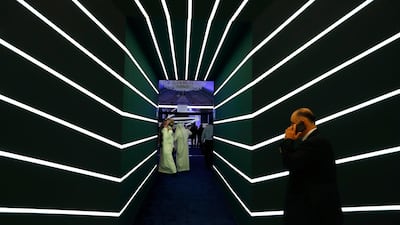The Saudi Arabian General Investment Authority, the kingdom’s state-backed inward investment agency, is working with the World Bank to improve the country’s global ranking in terms of ease of doing business and has identified 400 reforms that could help it attract more foreign direct investment.
“We are open for business ... we are working with the World Bank to improve the Saudi position ... and become one of the top 20 countries,” Ibrahim Al Omar, the governor of Sagia, told delegates on the second day of the Future Investment Initiative in Riyadh. “[About] 40 per cent of those [reforms] have been completed so far.”
The establishment of a commercial arbitration centre, allowing investors to start their business within 24 hours through Sagia’s online portal and cutting containers’ clearance time at ports from two weeks to 24 hours, are among the reforms that already been carried out, he added.
Saudi Arabia is currently ranked 92nd among 190 countries, ahead of states such as India, the Philippines, Argentina, Iran and Lebanon, according to the 2018 World Bank rankings.
Saudi Arabia, Opec’s biggest oil exporter, is diversifying its economy away from hydrocarbons, focusing on increasing the contribution of its non-oil economy by cultivating a local manufacturing industry and attracting foreign direct investment. The non-oil sector accounts for about 40 per cent of GDP at present. The collapse of oil prices in 2014 from a peak of $115 per barrel to lows of below $30 per barrel in 2016, accelerated the momentum to overhaul the economy.
The kingdom is introducing its Vision 2030 programme, the overarching blueprint of economic reform which has set the target of increasing FDI to 5.7 per cent of the country’s gross domestic product from 3.8 per cent in the next 12 years. The country also aims to increase the private sector contribution to GDP to 65 per cent from 40 per cent, and boost participation of small and medium-sized enterprises to the economy from the current 20 per cent to 35 per cent by 2030.
_______________
Read more:
On the cusp of a new era, Saudi Arabia courts the world
Saudi Arabia to return to growth next year, IMF says
PIF's new tourist investment a key part of 2030 vision
_______________
“Vision 2030 is a once-in-a-lifetime transformation and the investment is the core foundation of the vision with clear aims,” Mr Al Omar said on Wednesday. “This is a golden opportunity for all the investors to join us in our historic journey.”
The kingdom has so far managed to attract tens of billions of dollars of foreign investments into its energy sector since the first FII event in 2017. It signed investment deals and preliminary agreements worth $50bn on the first day of the investment conference, about $34bn of those going in to the energy sector alone. Riyadh, however, aims to boost investments in other sectors of the economy including industries, mining, entertainment and tourism.
Saudi Arabia has already launched ambitious projects including Neom, a $500bn futurist economic free zone being built on the western coast of the country, which will also be home to mega-tourism and leisure projects that will be open to private investments.
Sagia deals with investments in the country, identifying potential investors and helping them set up operations. The government agency has over the past two years streamlined the business licensing process to encourage investment – slashing the time to secure a licence from 53 working days to just four. Previously, eight documents were required to issue any business licence. Now a company can obtain a licence by producing only a financial statement and certified commercial registration. A company can also renew its licence through a self-service feature on Sagia’s website.
Earlier this month the International Monetary Fund said the Arab world's largest economy, which contracted 0.9 per cent last year, is set to expand 2.2 and 2.4 per cent in 2018 and 2019, higher projections than earlier forecasts. The brighter outlook is due to higher non-oil growth and an uptick in oil production as global crude output cuts that started in January last year come to an end.


